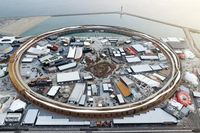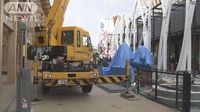The Osaka-Kansai Expo, a highly anticipated event, is set to kick off with its opening ceremony on April 12, 2025, at the EXPO Hall Shine Hat in Yumeshima, Osaka. This event, themed "Designing Future Society for Our Lives," aims to showcase innovations and cultural exchanges from around the globe.
As the opening day approaches, expectations are high, with the Japan Association for the 2025 World Exposition forecasting over 140,000 visitors on April 13, 2025. However, ticket sales have not met expectations. As of April 10, approximately 9.15 million advance tickets have been sold, which is only 65% of the target of 14 million tickets. This shortfall raises concerns about the financial viability of the event, which has a total operational cost of 116 billion yen, primarily covered by ticket sales.
Despite a recent surge in ticket purchases—an increase of about 450,000 tickets since April 2—many experts believe the sales targets will be difficult to achieve. The Expo Association set a goal of selling 23 million tickets by the end of the event in October, with 14 million of those being advance tickets. Currently, there are projections that around 2 million tickets will be reserved for educational and group travel purposes, bringing the total sales to exceed 11 million tickets.
Initially, ticket sales were primarily aimed at corporate and group reservations, and general public interest lagged. The Expo's strategy of promoting a "no waiting" experience led to the introduction of electronic tickets and a reservation system for entry. However, many potential visitors have criticized the process as overly complicated. In response to these concerns, the Expo Association plans to simplify ticket purchasing procedures, including the sale of same-day tickets at the venue entrance starting on the opening day.
In a press conference on April 7, Hiroshi Ishige, Secretary General of the Expo Association, emphasized that one of the key measures of success for the Expo is to avoid running a deficit. Osaka Governor Hirofumi Yoshimura echoed this sentiment on April 9, stating that achieving the target of 14 million advance tickets would be challenging and clarifying that the break-even point for operational costs is actually 18 million tickets.
Meanwhile, preparations for the pavilions are ongoing, with construction crews working tirelessly to meet deadlines. As of April 11, 2025, 44 out of 47 countries' pavilions, which are independently constructed, have been completed. However, 13 countries, including India, Spain, and Nepal, are still finalizing their pavilions. The Expo Association described the situation as "difficult but not impossible" regarding the timely completion of these structures.
The Emperor and Empress of Japan visited the Expo site on April 11, showcasing the significance of the event to the nation. Their presence is expected to add to the prestige of the opening ceremony, which will also feature Prime Minister Kishida and other dignitaries.
However, the Expo is not without its challenges. Rising construction costs have pushed the budget for the venue from an initial 125 billion yen to a staggering 235 billion yen. This increase is attributed to design changes and higher material prices, with the national government, Osaka Prefecture, and the business community each covering one-third of the costs.
Security measures are also a priority, as the Expo Association is implementing strict protocols to ensure the safety of attendees. According to Ko Itabashi, head of a public policy research center, the venue will have security checks similar to those at airports, aiming to prevent any dangerous items from being brought onto the premises. However, he stressed that vigilance outside the venue is equally important, citing past terrorist incidents at large-scale events.
In preparation for the opening, a test run was conducted until April 6, 2025, to identify operational challenges. This revealed that lengthy security checks at entrance gates could lead to long lines, prompting the Expo Association to encourage visitors to prepare their electronic tickets and have their bags ready for inspection.
Additionally, during the test run, methane gas exceeding safety standards was detected in the underground areas of the "Green World" section of the venue, which had previously experienced an explosion due to similar gas buildup. The Expo Association has since increased monitoring efforts to ensure safety.
As the opening day draws near, the Expo Association remains optimistic, aiming to improve ticket sales and address any logistical challenges that arise. The commitment to creating an engaging and safe environment for all attendees is paramount as the Osaka-Kansai Expo prepares to welcome the world.
The Osaka-Kansai Expo, featuring participation from 158 countries and regions alongside seven international organizations, is set to run for 184 days, concluding on October 13, 2025. With the world watching, the success of this event will be a testament to Japan's resilience and innovation.









